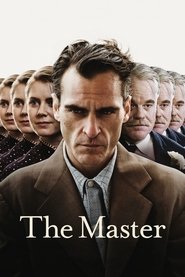Rewatched this Kubrick-core on the big screen in Seattle, WA. Despite its big, bravado performances, this is a film that needs to cast a spell on its audience and captivate them in a way not dissimilar to the way Dodd beguiles his followers. Unfortunately, two guys in the row ahead of me decided to drop acid—or, now that I think of it, it was probably MDMA—and were emoting just a little too much.
By recasting Peggy as the architect of the Cause, a pseudo-scientific sect modeled unsubtly after Scientology, Anderson makes it clear that his real subject is male weakness, concealed beneath layers of balls-out bravado.
— Adam Nayman (The Ringer)
[The central] codependent relationship, an ongoing barter of authenticity and phoniness, reflects the dynamic at the heart of Scientology as a new American religion of self-creation; but it also obliquely suggests another postwar cult that took Hollywood by storm, that of “Method acting” as taught by Lee Strasberg, Stella Adler and Sanford Meisner. […] A study in contrasts, these men are also more alike than they know—a point that Anderson underlines in a scene where they face off in neighboring jail cells, reduced to a state of animalistic barking. It’s a memorable scene, and indeed Anderson excels at making standout scenes—though they often have the feel of compartmentalized units, isolated from any larger construction.
— Nick Pinkerton (The Point Mag)
The character is based on Church of Scientology impresario L. Ron Hubbard, but it is expressly not an impersonation; the raconteurish style Hoffman devised for the role is more reminiscent of Orson Welles, a showman with his own notions of susceptibility.
— Adam Nayman (The Ringer)
Anderson portrays the Cause (and, really, religion in general) the way he portrayed the porn industry in Boogie Nights: as institutions that are inordinately influential because they offer the conflicted and disenfranchised an understandably tempting illusion of existential justification and self-fulfillment.
— Chuck Bowen (Slant Magazine)
The film is [a] very American story, with Dodd standing in for any number of movements toward self-empowerment. Americans love the idea that we can make ourselves into better persons, and in this sense The Master is a tragedy, since Freddie has not changed by the end of the film. Except that he is having sex with a real woman rather than a sand model. And he is using some of the Cause’s terminology to seduce her. How much more American can you get?
— Tom Stempel (Slant Magazine)
What draws Dodd to Freddie and Freddie to Dodd? They have a strange sort of partnership. Dodd has his processing techniques and Freddie has his secret varnish-cocktail recipe. Literally and figuratively, they spend the movie drinking each other’s moonshine.[…]
Side by side in their separate cells, the contrast between the two men is at its starkest. But its meaning remains ambiguous. It can be read in a couple of ways, as the opposition between spirit and nature, man and animal, or even (as several critics have suggested) between styles of acting, with Freddy as an exemplar of the method school and Dodd squarely in the older theatrical tradition. Another way to think about the contrast between the two is in terms of historical eras and genres. There’s something about Freddie that keeps him from fitting in to the postwar world. When he arrives back from the war, Freddie outwardly resembles many of the noir figures that populated postwar films.
[…]
Fundamentally, The Master is a story of love between unequals, taking place at a pivotal moment when American culture and history shifted irrevocably. It’s a version of the oldest American story, the fraught love between the civilized and the savage, the story that runs back from Sal and Dean in On The Road and Queequeg and Ishmael on the Pequod, or back to Robinson Crusoe and Friday. Ultimately, it goes back to that ur-parable of American colonization, Shakespeare’s Tempest. Freddie and Dodd are like Caliban and Prospero; the animal-man and his wizard master.
— Jacob Mikanowski (Los Angeles Review of Books)
Nothing unsettles [Dodd] for long: defections, hostile questions, doubt, imprisonment, all small bumps in the long right road. At the end of the film, still smiling with an air of benevolence that would scare the life out of anyone not seeking to grovel, he says: ‘Everyone needs a master.’ He doesn’t mean he needs one. He means everyone needs him, and if they imagine they don’t they are doomed.[…]
What Anderson is after, I think, resolutely seeking in his refusal to make the film go anywhere, and actually creating in the scenes I’ve described and a few others, is an intimate reconstruction of what submission and mastery, revolt and dominion, feel like when you’re caught up in them and have nowhere else to go.
— Michael Wood (London Review of Books)

